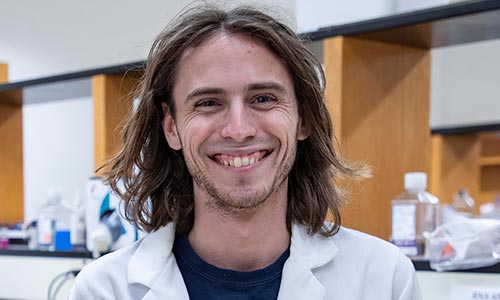
PhD Program: Pharmacology
Hometown: Blount Springs, Alabama
Mentor: Dr. Sangeetha Sukumari-Ramesh
Area of Research: Epigenetics and Intracerebral Hemorrhage
Why is your research important?
Intracerebral hemorrhage is an often fatal, always devastating disease in which blood
vessels in the brain rupture, causing neurotoxic blood components to cause widespread
damage to surrounding brain tissue. It currently has no effective treatment, and incidence
is expected to greatly increase as the overall global population ages. By targeting
the brain’s inflammatory response via epigenetic modulation, we hope to develop the
first effective treatment for intracerebral hemorrhage and ease the large burden the
disease takes on its victims.
Why did you choose your degree program?
My original career interest was in clinical neurology, but after working for a neurologist
for six months while in college I quickly realized that many, many neurological conditions
have no effective, reliable treatment and that treatment is often limited to palliative
care. Pursuing a PhD in Pharmacology allows me to do the most good for the most people
by helping develop new, novel therapies that may improve clinical treatment options
for suffering patients.
What is the greatest lesson you have learned from your mentor?
Science is difficult, and things will rarely go exactly according to plan. If an experiment
doesn’t work out how you plan, don’t think of it as a failure, think of it as an opportunity
to learn. Besides, there are a lot of interesting results in “failure.”
What have you found most beneficial about your program?
Augusta University is a very collaborative environment, and knowing that I can easily
ask any professor or fellow student a question and get a positive response. Additionally,
my work gives me the opportunity to feel like I can make a real positive change in
the world.
What words of advice do you have for someone considering this program?
If you find yourself interested in a specific department or specific faculty member,
don’t be afraid to send them an email! Scientists are universally nerds (myself included)
who would love nothing more than telling an interested potential student about their
work.
Have you been involved in any AU clubs or groups?
I serve on the Graduate Student Council and regularly attend the Graduate School Book Club, which amazingly still allows
me to recommend novels to read. Both have given me the opportunity to meet people
from outside the Biomedical Sciences program, which is always nice.
What have been some of your most rewarding moments as a student?
Recently demonstrating that our drug of choice has a profound impact in reducing levels
of neuroinflammation after an intracerebral hemorrhage in mice was very uplifting
and encouraging.
What are your career goals?
In the short term, I would like to land a prestigious postdoctoral position and do
high-impact, high-quality research in the field of neurodegeneration and/or neurological
disorders for a decade or so. In the long term, I think I would enjoy a teaching position
in which I could help train and mentor young and upcoming scientists. In the very
long term, I would like to retire and take up a position in my twilight years as a
ranger in the National Park Service.
What courses in your program stand out as most helpful for your specific career goals?
Neuropharmacology has been very helpful in illustrating how different chemical compounds
affect brain chemistry and communication and highlighting the exact mechanisms of
the compound’s effects.
What AU resources have been most helpful?
The primary faculty and research faculty. They are all willing to help anytime I have a question or need a clarification,
with a special shout out to the Department of Pharmacology’s excellent administrative staff. The vending machine near my lab which sells cherry coke is also very nice.
What do you do for fun?
I have far too many hobbies, including guitar, miniature painting, cooking, reading,
hiking, and a weekly board game/Dungeons and Dragons night with other close friends
in the program. I am very into music, and at the time of writing recently finished
listening through the book 1001 Albums to Hear Before You Die, and am about 100 albums
into my next project, listening to the top album in every subgenre listed on RateYourMusic.com,
a little over 2000 total.
"Everyone will tell you that picking your mentor is the most important decision you will make. I want to expand and add that it is equally important to pick a supportive department. An extended support network can be a huge boost to your resilience and success."
"My area of research is elucidating the underlying mechanism of the signaling pathway involved in the cell proliferation and invasiveness of prostate cancer"